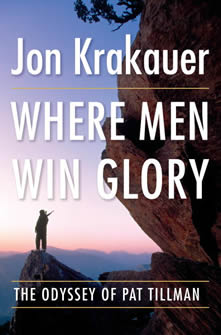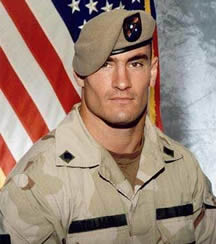Even more interesting than cool technology is » people. Homo sapiens are a fascinating lot, especially those who reside at either end of most any distribution bell curve. What motivates them to do the things they do? What do they value above all else? And why? What life-experiences have contributed most strongly to their view of reality?
Pat Tillman was one such person. He's the pro football cornerback who "traded the bright lights and riches of the NFL for bootcamp and a bad haircut."
 He walked away from a $3.6-million contract with the Arizona Cardinals to join the Army after the hijackings of 9-11.
He walked away from a $3.6-million contract with the Arizona Cardinals to join the Army after the hijackings of 9-11.
Contrast his behavior with that of Bernie Madoff, who said that money & profits were "all that mattered." Seems their values could not be more different. THERE's a comparative study in 'priorities' if ever I saw one.
Difficult to reconcile the two. Actually, Bernie is easier to understand. (Greed gone wild.)
So when I heard that Krakauer had written a book on the life of Pat Tillman (titled » Where Men Win Glory), I was interested .. even after the 6 years that've passed since Tillman's death. (While Bernie is still alive.)
[ Loved Krakauer's » "Into Thin Air." One of my all-time favorites. Was sad to see that story end. I also greatly enjoyed reading » "Into the Wild." ]
The title comes from a passage taken from Homer's Iliad (written 8th or 9th century BC), where Diomedes (who fights on behalf of the Achaeans) speaks to Glaucos (representing the Trojans):
"Who among mortal men are you, good friend? Since never before have I seen you in the fighting where men win glory. Yet now you have come striding far out in front of all others in your great heart."
So I checked the local library. Yes, they had a copy. But there was/is a long wait. I am #33 on that list. Never been more than #2 or 3 before. For anything. So it seems a LOT of people are waiting to read this book.
Fortunately, one of the librarians suggested I order the audio-book (comprised of 11 CDs). The wait for that was much shorter. Not many know about the audio-book it seems. (I didn't.)
I listened to the first CD yesterday (.. while fixin' some puttanesca). Wow. Intense. Story takes you deep quickly (.. into Afghanistan, the "graveyard of empires"). Recall that Afghanistan defeated the mighty Soviet Red Army in their 10-year war.
••• today's entry continues here below •••
On a related note, I was surprised to learn that people who sit behind a desk can override decisions made by soldiers out in the field (dodging bullets). In fact, this is precisely what led to Tillman's death (by friendly fire) ..
 .. when somebody sitting behind a desk ordered Tillman's platoon split .. over the objections of his platoon leader (Lieutenant David Uthlaut). The splitting of the platoon is what led to members of one section shooting at the members of the other.
.. when somebody sitting behind a desk ordered Tillman's platoon split .. over the objections of his platoon leader (Lieutenant David Uthlaut). The splitting of the platoon is what led to members of one section shooting at the members of the other.
Who would know better than the soldiers out in the field what strategies represent the best course of action? Shouldn't they therefore have VETO POWER? .. especially when their lives are at stake. (The guy sitting behind a desk is in no such mortal danger.)
So far the story has been more about the circumstances that led to Tillman's death, but I'm sure Krakauer will soon explore Tillman's psyche .. to try to unravel what made him tick. That's where Krakauer excels. Great story (so far). Fascinating, especially the insight into how the Army operates.
I spent 6 years in the military (in the Navy), stationed aboard a nuclear-powered ballistic-missile submarine (talk about 'cool technology'), which was home-ported in Pearl Harbor, Hawaii. Nuclear-trained officers in the submarine service are extremely competent and safety-conscious. (That's why you don't hear much about them.) So I'm trying to reconcile what I know about them with what I'm hearing about Army officers.
Krakauer implies that some seem more concerned about their prospects for advancement & promotion than the safety of their men. Hard to believe, especially in a combat situation. Tragic if true. How can the officer out in the field (in hostile territory) NOT have veto power?
I mean, human beings are imperfect. They make mistakes, which include bad decisions .. right? The officer in the field, whose decisions were over-ruled in this case (by those which led to Tillman's death) had graduated first in his class from West Point. In other words, he was quite capable of making smart decisions.
I would hate to be the guy (sitting behind a desk) who had over-ruled him. What does the desk-bound officer say when he makes such a decision, that has lethal consequences? "Oops, my bad." ??
For more along these lines, here's a Google search preconfigured for the query » where men win glory pat tillman jon krakauer book review

Sounds good; I had learned of Tillman's story via _The Economist_ and this definitely seems like a worthy read. It's in print in Commonwealth territories as well, too - I will suggest this title to the wife to get for our town library.
Apropos of the wider questions with regards to the function of the chain of command, I'd speculate that a Special Operations force like the Rangers has its own dynamics. Be nice to find a university library which has the journal _Military Psychology_: based on issues like http://www.informaworld.com/smpp/title~db=all~content=g785377531 this may well be something that has received study.
Somewhat related to this I recently came across an interesting article by a former Army man (which I found by looking for references to the great Shurz quote, with the bit so often left off: "if right, to be kept right; and if wrong, to be set right") discussing how Marines operate:
http://www.everydaycitizen.com/2009/02/my_country_right_or_wrong.html
To change tack - apropos of _The Iliad_, I have to confess my ignorance. I have never read it - Greek and Latin and studies of their literature were no longer part of the high school curriculum here in NZ during my day as they were in my father's, and I've never filled in that gap. However, I can still heartily recommend a book absolutely soaked with references to _The Iliad_: Dan Simmon's literary science fiction work in two volumes, _Ilium_ - http://www.sfsite.com/09b/il160.htm - and _Olympus_ - http://www.sfsite.com/11b/ol212.htm